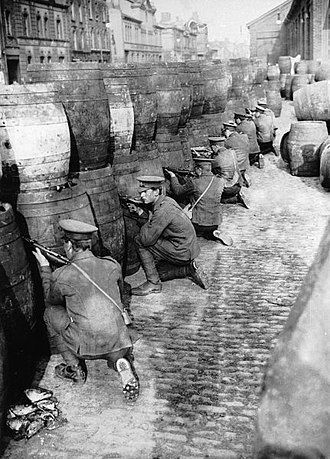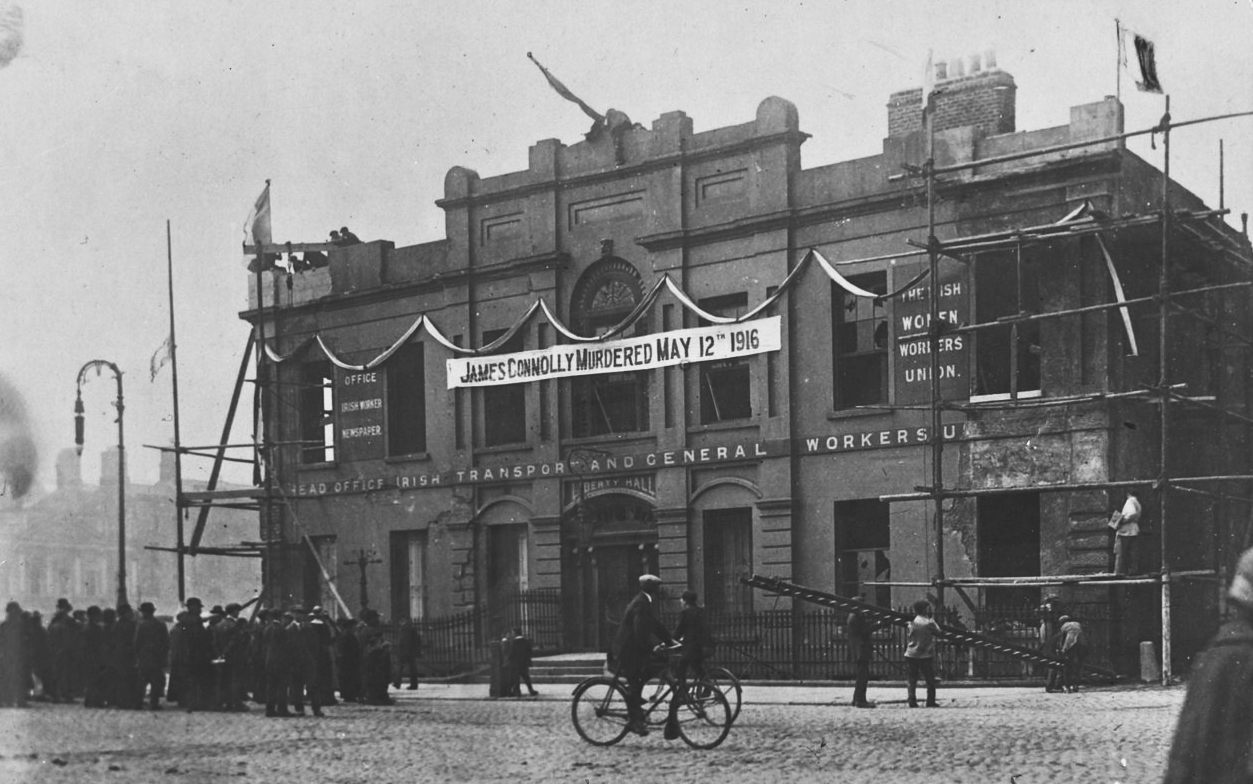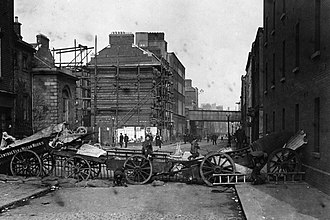Photo AI
Last Updated Sep 26, 2025
Public Reaction and Impacts of the Rising Simplified Revision Notes for Leaving Cert History
Revision notes with simplified explanations to understand Public Reaction and Impacts of the Rising quickly and effectively.
371+ students studying
Public Reaction and Impacts of the Rising
The 1916 Rising can be a popular study topic for students. The notes prior to this detailing the events of Easter week ,as well as the days preceding the Rising will certainly help when it comes to answering on it, but the impacts of the Rising can be just as, if not more important.
Initial Reaction
-
Many people were confused and bewildered in the days following the Easter Rising. In Dublin, rumours spread rapidly, and reliable information was scarce.
-
The offices of the Irish Independent were destroyed during the fighting, and the military heavily censored the Irish Times. People speculated wildly: were the Sinn Féiners responsible? Had the Germans invaded? Was this the beginning of a socialist revolution led by figures like James Larkin?
-
As the fighting ended, a clearer picture slowly emerged, but reactions were mixed. Unionists viewed the Rising as a treasonous attack on the British Empire in its hour of need, while many nationalists were shocked by the violence and loss of life.
- Some, particularly from the middle class, were outraged, especially those who had family members fighting in the British Army.
- However, the most intense anger came from the poor, who suffered the most from the fighting. An estimated 450 people, including 40 children, were killed, most of them from working-class backgrounds.
- Another 2,614 people were wounded, with much of the destruction centred around Sackville Street (now O'Connell Street), which the rebels had held for nearly a week.

-
For John Redmond, John Dillon, and the Home Rule Party, the Rising was a disaster. They feared it would undo all the progress they had made toward achieving Home Rule.
-
Redmond was in London during the Rising, but Dillon was in Dublin, witnessing the destruction firsthand. He denounced the British response in Parliament, warning that mass executions would only fuel resentment and turn public opinion against the British government.
-
Redmond passed on Dillon's plea for leniency to Prime Minister Asquith, but it was not well received.
-
The British saw the Rising as a betrayal, with some calling it a "stab in the back" during wartime. General Sir John Maxwell was given free rein to suppress the rebellion and restore order, with devastating consequences.
The Executions
- In the aftermath of the Rising, British authorities rounded up over 3,430 people across Ireland, many of whom had nothing to do with the rebellion. 79 women were also arrested.
- The leaders of the Rising were tried by courts martial— military courts that bypassed the usual legal procedures.
- In total, 186 men and one woman were sentenced to death, though not all of these sentences were carried out. The executions were swift and brutal, with some of the Rising's leaders shot just days after the rebellion ended.
- Among those executed were key figures like Patrick Pearse, Thomas Clarke, James Connolly, and Joseph Plunkett. The latter married his fiancée, Grace Gifford, just hours before his execution. Connolly, who had been gravely wounded during the fighting, was so ill that he had to be carried on a stretcher to the firing squad.
- These executions were spread over 10 days, beginning on Wednesday, 3 May, with Pearse, Clarke, and Thomas MacDonagh.
- As news of the executions spread, public opinion began to shift. What had been viewed by many as a misguided and reckless rebellion started to be seen as a noble sacrifice for Irish freedom.
- John Dillon rushed to London to demand an end to the executions. In the House of Commons, he condemned the British response, calling it "a clean fight, a brave fight, a brave fight, however misguided."
- Dillon's passionate speech, along with the growing public outcry, eventually persuaded Asquith to halt further executions.
- Those who were not executed had their sentences commuted to life imprisonment, while many others were imprisoned without trial.
Time for Home Rule?
- In the aftermath, both Dillon and Redmond urged Asquith to implement Home Rule immediately, hoping it would help to heal the deep wounds caused by the Rising.
- However, Unionists remained staunchly opposed, fearing that Home Rule would lead to Irish independence.
- Throughout May and June 1916, Lloyd George tried to broker a deal between Redmond and Sir Edward Carson, the Unionist leader. He persuaded Redmond to accept a temporary exclusion of six counties in Ulster from Home Rule.
- Carson publicly agreed to the plan but later reneged, realising that his Unionist supporters would never accept even temporary Home Rule. Southern Unionists were also alarmed at the prospect of partition, fearing it would divide the country permanently.
- The failure of these negotiations was another blow to the Home Rule Party, which was already losing support as more extreme nationalist sentiments began to take hold across Ireland.
- By the end of 1916, the Home Rule Party was in steep decline. The party had no clear plan for achieving independence beyond Home Rule, and as public opinion increasingly favoured more radical solutions, the Home Rule Party found itself isolated.
- For the first time, Redmond was forced to publicly admit that he would accept partition—a move that alienated many of his supporters.
Assessing the Rising
Militarily, the Easter Rising was a failure for several reasons:
-
The rebels received no significant support from Germany.
-
The leadership of the IRB and Irish Volunteers was divided over when or if the Rising should occur.
-
The Aud, carrying German arms, was captured, and its radio was unusable, cutting off communication with the Volunteers.
-
The rebels failed to secure key strategic positions, such as Dublin Castle.

- They did not have the support of the general public.
- The Rising resulted in the loss of many key republican leaders devoted to suffrage and socialist ideals, including James Connolly. However, politically, the Rising had significant successes:
-
The harsh treatment of the rebels, particularly the executions, generated sympathy for their cause.
-
This sympathy and disillusionment with the Home Rule Party led to a demand for greater freedom and increased support for the republican movement.
-
The British authorities mistakenly labelled the Rising as a Sinn Féin rebellion, which boosted the party's profile and support.
-
The Catholic Church, which had previously opposed secret societies and radical nationalism, joined the public condemnation of the executions, further legitimising the republican cause.
- The mass arrests of republicans turned what was essentially a Dublin-based rebellion into a nationwide issue, spreading the idea of armed resistance throughout the country. This momentum eventually led to the Irish War of Independence.

- The mass arrests of republicans turned what was essentially a Dublin-based rebellion into a nationwide issue, spreading the idea of armed resistance throughout the country. This momentum eventually led to the Irish War of Independence.
Was the Rising a Success? Both Sides of the Coin
As is the case with pretty much all of history, there is no real right or wrong answer here. As long as you can make a claim and back it up then you will see marks coming your way!
| The Rising was a Success | The Rising was NOT a Success |
|---|---|
| • The harsh British response, particularly the executions of the leaders, shifted public opinion in favour of the rebels, transforming them into martyrs and generating widespread sympathy for the cause of Irish independence. • The Rising discredited the Home Rule Party and boosted the profile of more radical nationalist groups like Sinn Féin, which later played a key role in the push for full independence. • It provided a powerful example of armed resistance against British rule, inspiring subsequent nationalist movements and leading directly to the Irish War of Independence (1919-1921). • The Rising drew international attention to Ireland's struggle for independence, particularly in the United States, where it garnered significant support from the Irish diaspora. • It helped to unify various nationalist factions, including those focused on socialism and labour rights, under the common goal of achieving Irish independence, laying the groundwork for a more cohesive independence movement. | • The Rising failed militarily, with the rebels unable to hold strategic positions like Dublin Castle and lacking sufficient arms and resources to sustain a prolonged fight against British forces. • The rebellion did not have widespread public support at the time, with many Dubliners viewing it as reckless and ill-timed, especially during a period when many Irishmen were fighting in World War I. • The leadership of the Rising was divided, with key figures like Eoin MacNeill opposing the insurrection until the last minute, which led to confusion and a lack of coordinated action among the rebels. • The rebels received no substantial assistance from Germany, as the planned arms shipment aboard the Aud was intercepted by the British, leaving the rebels poorly equipped. • The Rising resulted in the loss of many key republican leaders, including Patrick Pearse and James Connolly, which initially weakened the Irish nationalist movement and delayed the push for independence. |
500K+ Students Use These Powerful Tools to Master Public Reaction and Impacts of the Rising For their Leaving Cert Exams.
Enhance your understanding with flashcards, quizzes, and exams—designed to help you grasp key concepts, reinforce learning, and master any topic with confidence!
387 flashcards
Flashcards on Public Reaction and Impacts of the Rising
Revise key concepts with interactive flashcards.
Try History Flashcards46 quizzes
Quizzes on Public Reaction and Impacts of the Rising
Test your knowledge with fun and engaging quizzes.
Try History Quizzes29 questions
Exam questions on Public Reaction and Impacts of the Rising
Boost your confidence with real exam questions.
Try History Questions27 exams created
Exam Builder on Public Reaction and Impacts of the Rising
Create custom exams across topics for better practice!
Try History exam builder117 papers
Past Papers on Public Reaction and Impacts of the Rising
Practice past papers to reinforce exam experience.
Try History Past PapersOther Revision Notes related to Public Reaction and Impacts of the Rising you should explore
Discover More Revision Notes Related to Public Reaction and Impacts of the Rising to Deepen Your Understanding and Improve Your Mastery
96%
114 rated
1912-Easter 1916
Unionist and Nationalist Reactions to the Home Rule Bill/Crisis
277+ studying
186KViews